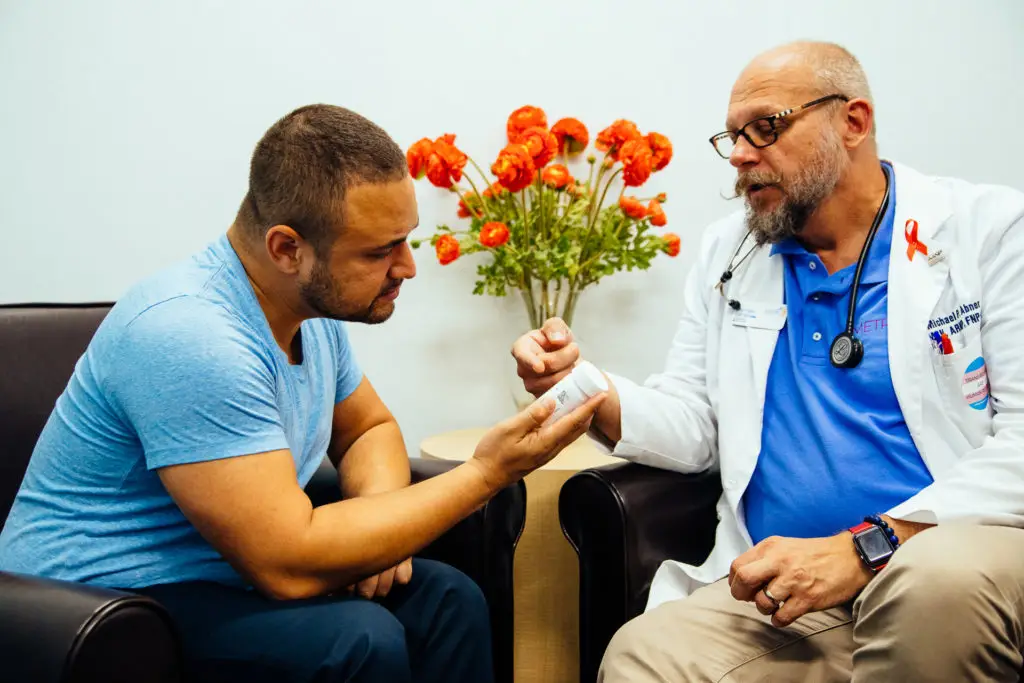On the surface, the convenience of having One Provider, One Appointment is a big benefit to those living with HIV. This kind of unified care has been nearly impossible to find. That is, until Metro Inclusive Health began providing both services in tandem. As it turns out, the benefits go far beyond convenience. Combining HIV and Primary care can greatly impact quality of life and overall health outcomes.
Compared to the state average of 70% and national average of just 67%, 91% of Metro Inclusive Health patients of Metro Inclusive Health seen for HIV care are virally suppressed.
“It’s common knowledge that primary care providers and specialists don’t always communicate, and that can be problematic,” says Dr. Luke Johnsen, Medical Director for Metro Inclusive Health.
“Equally, opting for HIV care from a primary care doctor can often underserve a patient’s needs.” Unfortunately, it’s not unusual to meet a patient who’s been in the same treatment regimen for five years or more. Oftentimes, they’ve spent years trying to get used to side effects that could have been handled by adjusting their treatment.
For example, Dr. Johnsen recently saw a patient, new to METRO, who had been taking AZT (zidovudine or azidothymidine) since 2017. This drug — the first FDA-approved HIV treatment, introduced in 1987 — has known side effects including anemia and complaints of “feeling ill.” In some patients, it’s also an example of a barrier to care.
“There’s typically new advances in HIV care every couple of years — they can be both more effective and efficient,” continued Johnsen. “Access to a good HIV-certified provider means knowing what advances are coming and how they may impact your individual treatment.”
Knowing the possible interactions of HIV treatments can make a big difference. For instance, did you know that acid reflux drugs can impact the effectiveness of HIV treatments? Got a sinus infection? Some antibiotics interact with HIV treatments and can cause complications. Also, some over-the-counter supplements can affect HIV medications and make them less effective.
Additionally, if you have a family history of heart disease, your provider should be aware of which HIV treatments may increase your cholesterol levels.
Commonly, patients believe they must live with certain side effects. For example, Dr. Johnsen remembers patients who’ve experienced vivid dreams, tend to feel a bit “buzzed,” or experience nausea or daily diarrhea. These symptoms, though, could have been addressed by adjusting treatment early on. Working with experienced providers means that patients can feel much better in their day-to-day life.
It’s true, an HIV provider or Infectious Disease Specialist may be familiar with medication interactions and side effects of HIV medications. However, they may also struggle to pick a medication for their patients’ non HIV-related health problems. Alternatively, they may not practice Primary Care due to the additional time commitment it requires. In this case, coordination of care can lag behind, as multiple providers have limited time to communicate with one another and coordinate medication changes or adjustments.
When it comes to managing HIV, what you eat matters. A well-balanced diet can help boost immune function, support healthy weight, reduce side effects, and improve medication absorption. Nutritional guidance is especially important for those dealing with comorbidities like diabetes, high cholesterol, or digestive issues, which may be impacted by HIV or its treatments. At Metro Inclusive Health, we take a whole-person approach to care—including helping patients understand how food, supplements, and lifestyle play a role in long-term health outcomes.
A specialist that combines HIV and Primary Care is likely to understand the impact of long term treatment. For example, some cancers can be more prevalent in long-term HIV patients. Equally, HIV patients who began treatment in the 80s may need to monitor for cognitive issues.
Primary Care providers are accustomed to screen their patients for a variety of medical conditions before symptoms develop and based on established guidelines. They also tend to follow their older patients at more regular intervals as health issues accumulate with aging, so that health changes are often detected more promptly.

A unique benefit of services provided through Metro Inclusive Health is our Copay It Forward program. Patients of any sort who use their normal copay to receive services — and more importantly, medications through a partner pharmacy — are in turn helping to provide services and medications to those who are un-or-under-insured.
Founded in 1993, Metro Inclusive Health began with one service: HIV case management. This means METRO has 30 years of experience in supporting those living with HIV. In that time, the organization has strived to become a centralized source for healthcare needs. To that end, we have expanded with over 100 services and programs including primary care, behavioral health, sexual health and prevention, advanced HIV care and more to be announced.
Nine Tampa Bay health centers. Find the location that’s nearest to you.
Schedule an appointment online or call 727-321-3854.

Dr. J completed his residency in Family Medicine at Franklin Square Hospital and continued his profession at multiple leading medical sites & hospitals such as Baltimore’s Johns Hopkins where he worked in the Division of Infectious Diseases for 11 years. Dr. Johnsen currently serves the community as the Medical Director of Metro Inclusive Health.
A 501(c)3 non-profit healthcare organization, providing 100+ programs and services to support community health.
Site by RKC.me
© Metropolitan Charities, inc. DBA Metro Inclusive Health